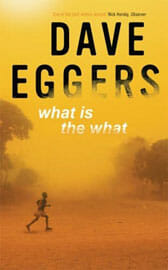Dave Eggers — What Is The What?

Gen X’s most gifted author gives voice to a former Sudanese refugee
For those of us in the Gen X rearguard, few books articulate our unique recipe of existential angst as well as Dave Eggers’ A Heartbreaking Work of Staggering Genius. Even so, I cringed when I learned that the master of meta-self-awareness planned to assume the voice of a Sudanese refugee for his next marginally fictionalized memoir.
Having made four trips to Africa, I could hardly imagine meeting anyone on the continent’s darker reaches who wouldn’t frown on the cynical navel-gazing of A Heartbreaking Work. In nakedly exposing his own need for attention and moral superiority, Eggers exuded a spoiled slacker condescension that somehow managed, despite all, to be endearing. It mocked its own flaws. But, who has time for narcissism in a work where boys are being abducted into slavery by Arab raiders, recruited by rebel forces, beaten by unsympathetic villagers or eaten by lions?
Fortunately, not Eggers.
With the success of A Heart-breaking Work and his quarterly journal McSweeney’s, Eggers no longer needs to prove his staggering genius; and in the lives of the Lost Boys portrayed in this work, there’s no shortage of heartbreak. The author is free to simply tell a story. And it’s a hell of a story—in every possible sense of the word.
What Is The What begins in Atlanta. Protagonist Valentino Achak Deng has been robbed in his modest apartment. There, bound and helpless, he realizes he wants to be back in Kakuma, Kenya, where “there was no rain, the winds blew nine months a year, and eighty-thousand war refugees from Sudan and elsewhere lived on one meal a day.” In his mind, he tells his story to his captors, as he’s silently told it to all those he’s encountered since coming to the States.
-

-

-

-

-

-

-

-

-

-

-

-

-

-

-

-

-

-

-

-

-

-

-

-

-

-

-

-

-

-

-

-

-

-

-

-

-

-

-

-








































